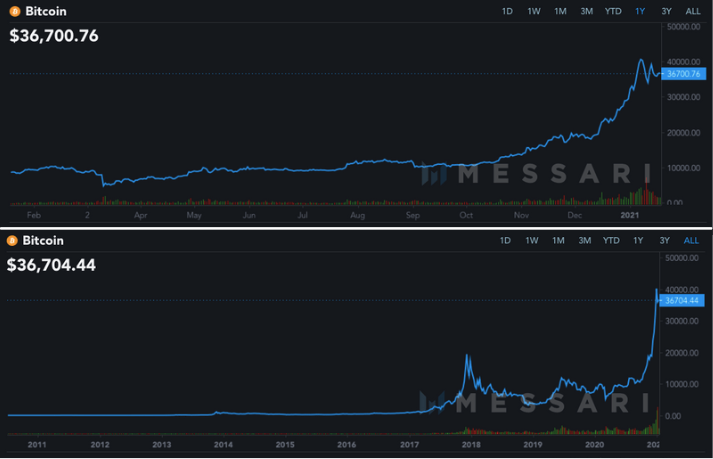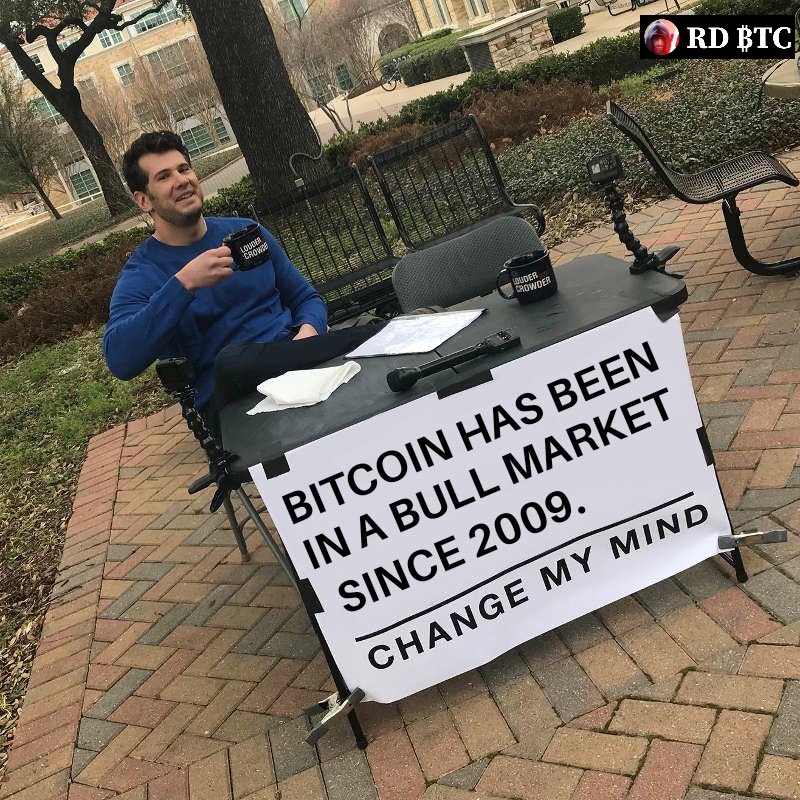Let's Discuss the Value of Bitcoin
TL;DR – Three ways to measure bitcoin's value
- In bitcoin: Bitcoin is fungible and scarce – that means no party can create new fraudulent coins, devaluing the value of each one. One bitcoin is one bitcoin and will always equal one bitcoin.
- In Satoshis: Bitcoin can be divided into subunits called Satoshis. A satoshi is one hundred millionth of a bitcoin or 0.00000001 bitcoin. Satoshi's allow bitcoin to be bought or earned in fractions.
- In Dollars: bitcoin has nascent features that make it superior to cash, so while it is generally volatile in the short term, bitcoin's historic trend, which is what's important, is upwards.
Bitcoin is the first digital asset, the oldest and most valuable cryptocurrency, but what is it worth? Well, there are three different ways to weigh bitcoin's value.
1 BTC = 1 BTC
Bitcoin is fungible and scarce: that means one bitcoin equals one bitcoin and will always equal one bitcoin. Because bitcoin has a supply cap of just under 21 million coins there can be no additional coin creation (which could make one coin today coin worth two tomorrow in purchasing power terms).
In other words, no single person or group of people can create new, fraudulent, or fake bitcoin and exchange them for other goods or other bitcoin. When people do this, as governments commonly do with fiat currencies when they print money, they are exchanging something that is costless to produce for something that is costly.
Creating money, or inflation, as it's called in economics, has caused wealth inequality, impoverishment, and even war. For instance, take Germany in the 1920s; citizens saw their wealth disappear almost overnight as new money made dollars today worth only fractions of yesterday's currency.
Inflation is generally considered criminal when anyone besides a government does it. States prohibit it because it entails extracting value from others without producing something of value: it's parasitic and a net loss for society. Fortunately, bitcoins supply is capped, ensuring bitcoin is an excellent store of value.
1 BTC = 100,000,000 Satoshis
Bitcoin is highly divisible; it can be divided into tiny fractions, called satoshis, which are each worth one hundred millionths of a coin. People, rather than buying a whole bitcoin, which is costly, can buy or earn pieces of a bitcoin.
Bitcoin's divisibility means people can buy or sell things for fractions of a bitcoin. Some believe bitcoin will become money and be worth millions of dollars someday. Without sats, buying or earning would be difficult, if not impossible. Bitcoin's divisibility ensures bitcoin can be used as money.
- Want to know more about satoshis? See What Are Sats?
So... 1 BTC Is How Many Dollars?
Bitcoin recently broke its all-time high price, crossing $20,000 and $30,000 in December of 2020. But it also dipped along the way, touching $4,000 in March and dropping to $30,000 after hitting the low $40,000s.
Bitcoin continues to be volatile, but that doesn't matter – volatility is a feature, not a bug. Volatility is the baggage that comes with being the first (and likely only) asset of its kind. As a relatively new and unique asset, bitcoin is constantly being valued and re-valued by a still-growing group of people – so its price is going to be volatile. But that doesn't make it a bad investment.
Its ecosystem — the projects, companies, and people that support it — continue to get better. Before bitcoin, currencies couldn't really be improved on, but bitcoin is different.
Bitcoin is run on a network that uses updatable and improvable code. The code itself and the ecosystem around it is stable in its essential components (like its supply cap), maintaining its value, but also flexible enough so that real improvements can be implemented.
The currency has many novel features — it's decentralized, immutable, and borderless – that people value. And the value people place in it will only continue to grow as bitcoin technology improves. That's why the trend tends to be up, why despite current volatile world events it continues to rebound when other assets fall off or need Federal aid to survive.

Bitcoin is still relatively young – it just had its 12th birthday – and in some ways, it closely resembles the niche project it was when it started. But improvements have been made, drawing in new money and sending its price to $30k for the first time ever. Improvements will keep coming and as they do bitcoin's historical trend will continue to be upward, making it a great investment.

Bitcoin compared to fiat currency
Fiat money is the opposite of bitcoin: it is easy to make, its monetary policy is dictated by a few (not by a protocol) to the masses, new money is distributed to well-connected insiders, and it historically only depreciates in value. It may seem more stable but it's not. And it is definitely not a good store of value.
In antithesis to fiat is bitcoin – Bitcoin isn't pegged to anything and its supply cannot be increased. This makes it a better store of value and eventually could make it better money.
Bitcoin is what a monetary asset should be – it appreciates compared to other monies and goods, it is stable when measured by itself, and it is divisible, portable, and fungible. It will in all likelihood be worth more tomorrow. Be sure to get some bitcoin today for free (and hedge against cash) by shopping at Lolli.com.
Thanks for reading! Happy stacking and be sure to follow us on Twitter @trylolli.
🍭,
The Lolli Team

